writing and general fandom flailing from abcooper. Prompts very welcome, hit me up
Don't wanna be here? Send us removal request.
Text
one of the reasons i love the murderbot diaries is how it doesnt flinch in trying to grapple with some of the Big Questions, such as "why is it that Humanity™ is the goal to strive towards for artificial intelligence if it wants to be acknowledged as a person?" and "What does it look like when someone is both undeniably a person but also unapologetically nonhuman?" and "what if the magic school bus had a gun"
13K notes
·
View notes
Text
The first time you pick up a stone, you do it because it is beautiful, glossy, struck through with streaks of pale. You do not know the instinct that possesses you to keep it, but you have a pouch along the soft seam of your belly and you place it within. The world is new and you are new with it, and you leave behind the rocky plateau that birthed you and begin to travel with no destination.
The next time you return to that place of your birth, you are much larger, and it has grown as well. The rocks have shifted, pressed against each other to form great crags and peaks. Your pouch is full almost to overflowing, a collection from your travels, and you understand now what has possessed you to keep it all. You find a cavern among the peaks - it is your cavern, it is a space emptied out because it gave birth to you, and you are the raw material to fill it.
You place within it the stone you took eons ago from the very birth of these mountains and yourself, and you place everything else from your pouch within that cavern as well. You do not have others to speak to, but you are developing a language nonetheless, one spoken by you alone within your mind. In that language, you turn over for yourself a new word, a new concept, to describe yourself.
You are the record-keeper. You have seen mountains rise and oceans settle, and you have compiled pieces of them, a vast library of the world. Your role is to collect the world itself and archive it. You take exhaustive care of every piece, conceptualizing for yourself the relationship a keeper must have to what is kept. It is your responsibility. You spend years or decades at a time curating and memorizing this archive, and in between take trips to gather more artifacts. You go through every stone, every bone, every lump of clay, and you remind yourself, like someone reading and rereading a treasured tale, where they came from and what they represent.
Your word for yourself is no different than your word for your cavern. You are the cavern, because you were created from it, both of you a pocket of this mountain sent out to walk the earth and chronicle its creation. You are neither of you a separate object from the mountain range, anymore than your scales are objects separate from yourself.
Likewise, your word for the world is no different than your word for your collection - you call them both Alam, and their meaning is the same to you. Alam is out there, surrounding you, made up of everywhere you have ever been. But it is also in your cavern, where you protect its memory and in doing so protect its existence. What does existence mean, if there is no record keeper? If you had not been created to recall that plateau, before this mountain was born, then the plateau would not have existed. Your hoard of stone is a hoard of existence, and your memory is its preservation. You create a concept, and a word, for sacred, for holy, for duty.
When the dwarves come, they interest you. They are small and die quickly. (It takes you a while to understand this; they are largely interchangeable and look very similar to you.) You understand for the first time that other fleshy creatures, which have risen up around you since that first plateau, are dying and replacing themselves. You meditate on this concept of death.
Your job is preservation, but you cannot preserve all of them, at the speed at which they die. There is no room in your cavern. If each of them lives and dies with no record, have they lived at all? It is a tragedy for something to be cut from existence, from memory, in such a way - you must develop a word for this new concept, mourning.
But the dwarves, though they are so small and die so fast, carve away underneath the mountain. They create caverns of their own. They find the ore hidden beneath the surface of the mountains and they melt it, craft it, create beautiful sturdy things that would not exist if they had not existed. Here is another new concept you must grapple with: transformation.
It is your place to record the world, but theirs to transform it, and in doing so, they create a record of themselves. Alam cannot forget them, for they have changed her.
The dwarves speak to each other, and when they find you in their explorations - for they leave no stone of the mountainsides unturned - they speak to you as well, in guttural barks that echo off your walls. They point their sharpest creations at you and exclaim loudly.
You did not know that language could be shared. You did not know creatures other than yourself had it. Theirs is simpler than yours, for they have had much less time to develop it, and you learn it easily enough. Once you learn to recognize dwarvish, you begin to notice the languages of everyone else around you. There is so much happening, more than anyone could preserve in a single archive, if you take into account the activity of mortal creatures.
From the dwarves, you learn the concepts of mortality, concepts that you must mull over and philosophize about, for they remain alien to your own experience. You learn about fear. You learn, also, that there are others like you on the earth, and that dwarves have found your kind before and have a name for you in their language.
Eazim, they call you. The Great Ones. The Lonely Ones. They bring you their creations sometimes, and you add them to your archive, gold and jewels joining the stones and clay that you curate. Now that they have pointed it out, you notice others of your kind when they pass by - eazim young enough to still be on their own initial journeys, keeping their alam within their pouches. You do not have your own word for them, and so you use the word of the dwarves - your word for yourself is about you and your cavern, and would not apply to them. You do not speak to them. These other eazim do not need you to record them; they must record themselves. Nonetheless, you find reassurance in their existence - it is a lessening of the burden on your shoulders. The work of preserving alam is shared work, now.
When the dwarves cease to be, you do not need to mourn them. The dwarves have not left existence; their caves remain, and their great works remain. You add many of those works to your collection, and they take up perhaps more space in the archive than is equal to their magnitude. You must develop language to describe a new concept, a bias within yourself - preference. You liked them, and the things they made. You want them well remembered.
Other species with language rise and fall. You do not make yourself known to all of them, but you find that your preference remains for those that are transformers, creators. They have something in common with you, there is an overlap between their purpose and your own. Often, they recognize the kinship just as you do; like the dwarves, they bring you contributions, and you archive them accordingly.
Your least favorite kinds of people, you find, are those that would remove. You have learned the concept of hatred from other languages, and it is a common concept in the mortal beings of the world, but it is alien to your own nature. You have no instinct toward the destruction of others, toward enmity or grudges. Your every instinct leads you in the opposite direction, toward preservation and memory. Toward alam. But when people try to remove from alam, you do not mourn them after you have killed them. You have a duty, and they have breached what is sacred.
As your archive grows larger, the people who try to remove from it become more common. You understand that it has become a legend in nearby communities. They call it by other words, treasure, hoard, riches. They have words for you, as well, but aside from your own name for yourself, the only one you keep is the dwarves’. Eazim. It has become your identifier, as much as your own name for yourself. The lonely ones. The ones who stay the same while the world changes.
The mortal people you notice the least are the ones who come from dirt and return to it, with no forays into the more enduring realms of metal and stone. The ones whose transformations are centered on building structures out of wood, tilling soil, growing fragile shoots in soft earth. They are so fleeting, their structures there and then gone, and after a while you have exhausted yourself of mourning for the transient, and cannot muster the energy for it. Whole civilizations rise and fall without attracting much curiosity from you.
But as more people come to remove things from you - to steal your riches, in their own terms - you begin to notice who it is that has sprung up around you most recently.
They call themselves humans, and you soon find that they are a varied bunch. They build from wood and stone alike, but they do not carve into the stone where it exists; instead they bring loads of it to their wood structures and heap it together into a precarious balance bolstered by mud. They bake clay bricks and build with those as well. They use some metals, the softest of them, without any of the dwarf’s prodigious skill, and seem very happy to stab one another with the blades they produce.
Their oddest trait is their lust for expansion. They do not transform alam the way the dwarves and other creators have done, but nonetheless, they begin to have an impact. You watch with curiosity as they cut away more and more at the trees around them, until the forest shrinks and disappears. The animals become scarcer. The humans then struggle to kill enough animals, and they begin building their wood and stone and brick structures in a new place. The process repeats. They make flat pathways back and forth between their settlements and send things up and down their pathways on carts, so that they can live in the places with no animals by killing twice as many animals somewhere else.
You ponder all this fast-paced activity, and watch as they change the world around you, and you must acknowledge that this too is a kind of transformation. But you ponder an unsettling new concept; this transformation is different, is not creative like the dwarves. You require a new word for the concept of transformation that is the opposite of creative - humans are destructive.
Eventually, there is very little forest left around your mountain. There are still animals; there are the ones that humans bring and keep penned in, creatures made stupid and docile as their only option. Other animals have retreated up into the mountains, found homes that suit them less well than what has been taken from them. The prior inhabitants fight for resources, and Alam changes further.
The human settlements grow larger and closer together. They begin digging into your mountains, as the dwarves did. They bring out coal and burn it, using it up. Their settlements begin to creep up the mountain, and you begin to see them up close more frequently. They camp along nooks and ravines. Wherever the slope is not steep enough to dissuade them, they set up temporary cloth dwellings that give way to wood, to clay, to stone.
The first time they destroy a peak of your mountain entirely - mining out coal haphazardly until the entirety of it collapses in on itself - you discover what it is to feel rage. You don’t need to make your own word for it; it’s a concept you’ve learned in dozens of languages over the eons, and now you connect it to your own experience. It is an emotion that belongs by nature to shorter-lived creatures than yourself; it is … depleting. It is an experience that cannot be sustainable through timeless years, an energizing kind of desire that by all rights must burn itself out.
You soon discover that rage and mourning are concepts more closely related than you had ever understood. Other mountain peaks fall. The shape of everything around you changes, and human settlements draw nearer to the heart of your mountain range. You have always been in tune with the entirety of your domain; you travel yourself only rarely, for the work of preserving the alam you have already archived has become a full-time job. But you know the simple languages of the animals, of the rock, of the trees, and you always listen as you work.
You discover that you understand now, something of fear; you fear that before long humans will come too close, that they will collapse the very heart of the mountains and bring your cavern down on itself. You fear that they will destroy alam; you fear that elsewhere, they already have.
At some point, you realize that it has been a long time since you have heard another eazim pass. You begin to look for them actively, to reassure yourself. You listen for legends, as you have heard from so many people before humans - new names for your kind, spoken in any combination of fear and awe and greed.
There is nothing.
The humans build their settlements larger, and burn more coal. They begin digging faster, and the air above their settlements begins to turn gray. The water begins to smell, resources lessen, the remaining animals begin to flee.
You remember the dwarvish language, as you remember everything else. Eazim, which means the great ones; you adjust it, according to your mournful suspicions. Eazimkir, the last one.
When the next human enters your cavern, you almost kill it on sight. Every human to approach you has been a thief. But this human is not moving stealthily, and it is not carrying a blade. It carries only a small sack of bread, and has water streaming down its cheeks. It does not notice you; you are, you think, too large for it to understand. It thinks you are a part of the mountain itself. (It is not wrong.)
It is small for a human, and seems dumbstruck by your archive. You aren’t sure at first, but as you watch it wander through your cavern, you become certain that it is a child. The braids in its long hair mean a girl-child, and she shows no interest in theft. She nibbles on her bread and shows only a polite curiosity. She touches things, occasionally, but touch does not alarm you if it comes with no ill intent; you have preserved your alam against eons of wear, and you can preserve it against this.
You have rarely had much opportunity to study humans closely, and now you watch this one with as much curiosity as she is currently showing to a dwarven warhammer with a delicately carved design along its sides. The hammer is called Idross, and was forged of ore from the tallest mountain in your range, the one the dwarves called Sinur, where there was, in their time, snow along the peak even in the warmest times of year. Idross belonged to the dwarven king Tamir, who came to speak with you as a child and asked you to share the wisdom of the mountains, and was passed through his lineage.
This human child still has not even noticed you. She is small, with brown skin and dark hair. Her body is covered in cloths that seem unnecessary against the currently mild weather. They might be for decorative purposes, you suppose; they are brightly colored. The water on her cheeks has dried as she has explored your cavern. She makes little babbling sounds of wonder to herself, and while all languages come easily to you, these sounds are not a language. She may be too young, yet, to know the human tongue.
When she climbs over your tail, you move it; an instinct, with no underlying intent to alarm. But she freezes. You watch her small gaze as it follows your tail several feet down to its point, and then travels back up the other way to find your flank, to recognize the pattern of scale rather than gravel. She finds your eyes, and her own widen in terrified comprehension. Fear; you have come to understand the concept of fear.
“If you mean no harm to me, then I mean none to you, small one,” you reassure her in her own language. Animals do wander on occasion into your cavern; you said much the same thing not a decade past to a pair of bear cubs who wandered in and looked equally afraid.
The human does not answer, but nor does she cry out in terror or flee. She appears frozen. Your interest in her wanes rapidly; she is not yet old enough to meet her species' rapacious appetite for destruction. Nor is she interesting to speak to, as other people have sometimes been. And you have work to do.
You are back near the beginning of your collection now. You work through it in chronological order, always, and leave on your travels - less and less often - only when you have reached the very end. The work of preserving the oldest artifacts is always the gentlest, for time has its impact on all things. You cradle a shard of obsidian to you, carefully, from a volcano that you know gave birth to a large caldera, which is now a lake in a region whose first people called it Indisia. It has begun to crumble, since you last cared for it, and now you croak the words - carefully, carefully - that recall to it and to you what it was, the history of its existence. For a moment, as you tell it about itself in its own language, it glows with the concentration of self-understanding, and then as your words fade, so does the light, and it sits in your palm whole again, in the form truest to its own existence. Preserved.
This is your work, and you forget about the child entirely for some time, caught up in the necessary focus to do it well. You remember her only because she interrupts, creeping closer with that same fascination on her face, and after a momentary pause to ensure that she is not going to interfere or destroy, you allow her to watch.
Several artifacts later, she is sitting with her elbows on your finger, staring in wonder as the glow fades from a small reformed lump of clay, now as wet and moldable as when you first collected it from a newly formed seabed. You feel a pang of something; not mourning, but something related, a preference for days past, and a knowledge that while you might preserve them, you cannot return to them. There have been children of many different people, through the eons, who have come to learn from you. Humans have never shown any interest in learning. You miss it.
This child is in all likelihood too young for speech, but despite that you speak to her in the tongue of her people as you pull forward the next piece of your collection, a globule of glass from one of the first lightning strikes. As you explain its origin, you are speaking partly to her, and partly to the shadow of a thousand ages past, a thousand faces that once came here to learn and are now lost. You take comfort in the act of teaching, in that shared act of preservation.
When you begin to croak the words to recall it back to its true form, the little girl croaks them clumsily next to you, and when the faded globule begins to glow with the memory of its true nature, the knowledge is coming to it from both of you.
You stare, astounded, while the child claps her hands and looks delighted. As well she should; humans have long demonstrated to you their capacity for cruelty, for a suicidal shortsightedness, for destruction. They are transformative, clever but unwise, and you have come to understand that they will not fade away like other people, but instead bring with them the end of Alam and of all things. You, who have existed since the dawn of time, have looked at them and known that you are coming to an end.
You have felt fear, and you have mourned.
And in this moment, with this human child clapping her hands, you find yourself needing to create a new word in your own language, for the first time in a very long time. A new concept comes to you: hope. You hope that perhaps you will come out the other side of this destruction; that the world will come out to the other side. You hope there is more to humans than the destruction they wreak. This child has listened to you speak of the true nature of existence and she has understood you, understood enough to speak it herself.
You will need to think more about it. For now, you place the glass back in its space and bring the next artifact forward to you both. “This is the bone of a creature that once walked the plains…”
The child stays with you for countless artifacts, and she croaks along, but a few hours after the sky darkens, she falls asleep, slumped against your hand where she has been leaning. She is remarkably small, smaller than the single finger that she is curled against. You take care not to injure her as you detach from her to continue your work, setting her against the ground.
Her bag is empty, you realize. She has eaten all the bread. It is not your experience that human children travel on their own - they are dependent on the adults of their people, at this age. It is possible that she is orphaned of course - if that is the case, she will likely die soon. She will not be able to feed herself.
It is not your role to interfere in the way of nature, but you find yourself motivated by that slender thread of hope she has ignited. You would not see it extinguished so easily.
Gently, carefully, you gather her up. For the first time since you settled there, you abandon your archive with the job only a fraction complete - long enough to fly toward the closest human settlement.
It dismays you all over again when you see it. You have no need to fear humans; they rarely notice you if they aren’t looking. Just as the child mistook you for a part of the cave, the humans often see you only as a part of the sky, of the mountain, of the trees. It is an oversimplification to call it a mistake, even - you are indeed a part of all those things.
But you do not care to travel too close to the human settlements, with their smoke in the air, their waste and their hunger. You cannot help but view their city as a corruption of the landscape. You come closer than you have previously cared for, and find, on the outskirts, a small hay wagon still partially covered in straw. You lay the sleeping child there, and trust that she will be found. It is all you can do; it is more, perhaps, than you should have done.
You return to your work.
You are approximately halfway through your archive the next time a human interrupts you. I am much larger - if not fully grown, then surely close, you think - and I approach much more cautiously. There is a blade at my waist, but not in my hand. You hear my footsteps over the gravel, and then my intake of breath as I find the entrance to your cavern and see everything inside.
You hear me, too, as I make the decision to crouch in the brush rather than come in and announce myself, and it puts you on guard; this is the behavior of thieves.
You do not interrupt your work to address me, but you keep listening for movement. I stay in place for long hours. If I am waiting for you to sleep, I have a long wait; you have never slept, and you have been awake for many many eons longer than I will live. This, you think, is the paradox of humanity: that in their destruction they have such an immortal impact on the world, and yet any one of them is so short-lived that they cannot begin to experience the breadth of their own influence.
I stay in place through the night, and into the dawn. You hear me shift occasionally - to eat some small meal from my pack, to relieve myself, to find a more comfortable position - but I do not go far.
It is not until well into the next morning that I approach. You wait for me to fully enter your cave, and then look directly at me. I can hardly be surprised at your presence; I have been watching you work for hours.
I bow.
It takes you by surprise; it is a motion you remember from the dwarves, who used to visit for wisdom and kinship. You know that it is as much a sign of respect among humans as it has been among peoples past.
You nod your head in return; it must hearten me, because I find my voice.
“Greetings, oh great one.” She pauses after that pronouncement, but you have nothing to say to it, so you wait. “Uh - that is to say, hello. Do you remember me?”
That is a surprise.
“I remember every human to enter my domain,” you tell me, since it is the truth, “but I cannot tell you apart easily.” Also the truth, but only one human has come into your presence within my lifetime, and you are certainly intelligent enough to reach the obvious conclusion. “You are the child who wandered in not long ago?”
“Yes, I came here as a child. It was by accident - I was lost. You saved me,” I say. “You carried me back to my town, and I always wondered why. I mean - why didn’t you eat me?”
You are puzzled by this question.
“I don’t eat,” you answer. Eating is a mortal requirement.
“Oh - but you didn’t have to bring me home. You could have let me die. Why did you?”
It is a question you have pondered yourself, over the past few years.
“You understood the essence of things,” you try to explain it to me. “You were able to speak to alam with me. I didn’t know your people could. I didn’t know if all humans could, or if you were unique among them; I still don’t know.”
“Speak to alam,”I murmur, repeating you. “You mean the magic, don’t you? You taught me magic, while I was here. I mean - I watched you do it, and then I repeated it. I don’t think you meant to teach me.”
“It never occurred to me that you could learn,” you admit.
“Well, I did,” I say boldly. “And I kept learning, once I got home. My parents brought me to our local wizard and showed him what I could do, and he taught me everything he knows.”
Since you have nothing to say to this either, you stay silent. You are becoming impatient; it is rare that you take a break this long from your work, and it makes you nervous to set aside what is essential to make time for what is not.
I wait a long moment, perhaps hoping for a response, and then continue when I don’t get one. “I mean - he did his best, but he only knows so much. And now he’s trained me as far as he can, and the only other person I know who can do magic is - well, you. So here I am, looking for a teacher. Will you teach me?”
The reason for my approach revealed, you relax. I am not here to remove from your collection. The only thing I want is your time.
“I will not pause my work to teach you,” you tell me, “but if you wish to watch me as you did before, you may learn from me in the same way that you did as a child.”
“Can I ask questions, as you work?” I ask, and when you nod, I am pleased.
You pull an elvan crown - the work of a people long gone from Alam - from your collection, the silver tarnished by age, and begin to croak at it, reminding it of what it should be. The language you speak is not a human language, nor is it entirely your own - it is the language of ore, dug from deep in the mountains beneath you, and forged into its true shape. I pull parchment and ink from my bag and begin to record as best I can, while you speak the essence of the silver back into it so that it begins to glow with the glory of a return to its truest self.
When you are finished, you turn to me, puzzled.
“What are you doing?” you want to know.
“I am writing a description of your magic,” I explain, and then find myself in the confusing position of explaining writing to an ancient immortal being.
You have never seen written language before. You are fascinated, and demand that I read the text aloud to you - as I do, I find that I am reading to the crown as well, and it begins to glow once more.
“You have recorded the essence of the artifact on your parchment. And now any other human could read it?” You want clarity on this subject, for it is entirely foreign to you. The work that you have done, the knowledge that you have - it has resided in your own mind for eons, and has never been recorded anywhere else. You had no idea that it could be.
“If they learn how, they can, yes,” I answer, and begin to explain to you, in confused stops and starts, about schools, and education, and the ways that different humans come to know different things.
You are silent for a long time, thoughtful. I do not interrupt. Finally, you rouse.
“I have known for some time that humans will bring about the end of my kind,” you say. “I have mourned myself, and others like me. I did not want to die - I have stored the knowledge of alam inside myself, and I did not want it to die with me. But now you tell me that even as humans bring me to my end, they also bring the ability to - to record me. To share me among each other, so that I live on in your archives. So that my alam becomes a part of your people’s alam. That is to say - you can take my world, and make it your own.”
You are fascinated by the concept. It rouses something in you. At the moment, I am puzzled. I do not know what you mean by alam. I do not know yet that you are the appointed keeper of the world’s history, or that you make no distinction between “history” and “existence.”
But I concede, nonetheless, that I am able to record your learning and share it with others. That in fact, this is my goal in coming here.
“You must come everyday, and record it all,” you say to me finally. There is something exultant in you. “Every piece - every essence. You must get it all.”
I look around, wide-eyed, at the enormous cavern surrounding me; the thousands of years of history that make up your alam, and that you have protected so industriously. I am not sure I could write about every artifact in your cave if I spent a lifetime here.
“That’s going to take a very long time,” I say, uncertainly. You smile at me, an expression made of teeth and stone and amaranthine knowledge.
“Then we should not wait any longer to start the work. Are you ready?” you ask me.
And I put my quill back to paper, and we begin the work that will last me my lifetime. The work of learning the entire world.
You are a dragon taking care of a child who seemed lost close to your lair and you also taught them some magic, years later, that same child came back to you, so you could help them with a certain subject at the magic school since they weren’t understanding it.
#coop writes#been awhile since I lived up to my dang blog title#this was fun!#a coop original#is the tag I will be using for nonfanfic writing btw if you would like to block it
4K notes
·
View notes
Text
I started my queer lit year off with Bear Bergman’s “Blood, Marriage, Wine, and Glitter” and if you want to feel really warm and good about all the ways it’s possible to love your fellow queers and all the ways you grow from it, I highly recommend. It keeps putting me in a really good mood on the train.
2 notes
·
View notes
Text
I’ve decided that 2023 is my year of immersing myself entirely in queer lit - I’m going to read queer stories by queer authors only and see if I can unlearn straight culture.
Who has book recs for me, pals?
8 notes
·
View notes
Text
combine your first real fandom with your current one to create a terrible, terrible au
#I think a Star Trek Critical Role AU would be phenomenal and I want it#captain Fjord and first officer Beau obv#since this is specifically a TNG AU#Jester can be the ship’s counselor#obv Caduceus is chief medical officer#and Yasha is the half Klingon chief of security#if Caleb and Nott are the mysterious passengers is that veering into a Firefly AU?
86K notes
·
View notes
Text
sound ON
#dnd tag#I don’t think I had one of those that wasn’t abt being in love w Marisha ray#so now it’s that#block accordingly
38K notes
·
View notes
Photo




Iconic.
#and just like that#I would kill for an animated series of Gideon the Ninth#put Noelle Stevenson in charge
12K notes
·
View notes
Text
ok lesbians, i need recommendations. i am looking for just the smuttiest published lesbian romance novels that money can buy. Jussst absolute filth with a plot that is the thinnest most threadbare excuse for it. I am looking for recs that u need to send me on anon because you can’t admit that you’ve read them.
Whatcha got?
9 notes
·
View notes
Text
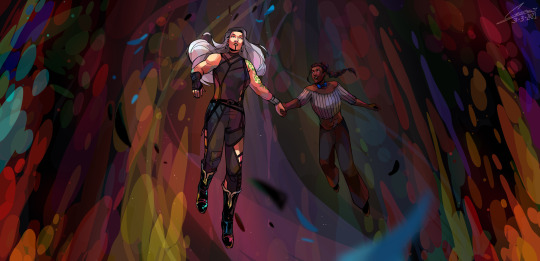
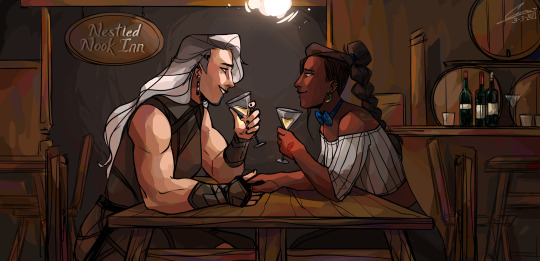
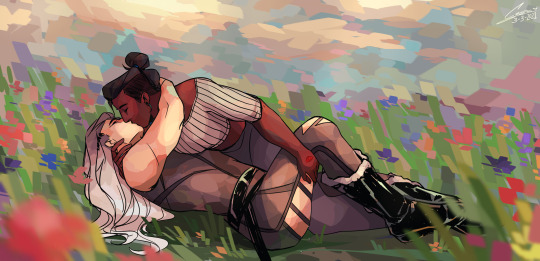
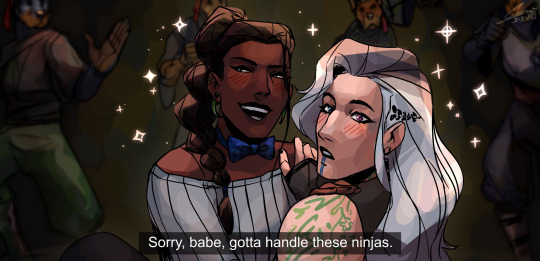
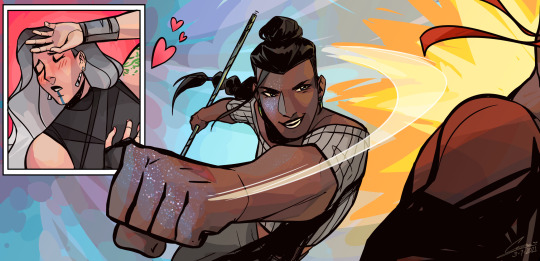
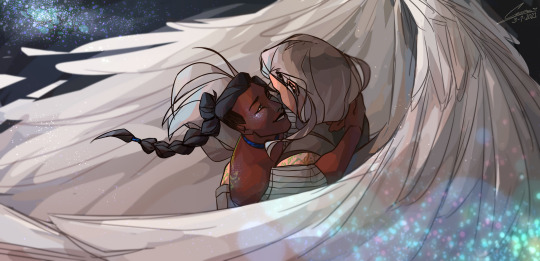
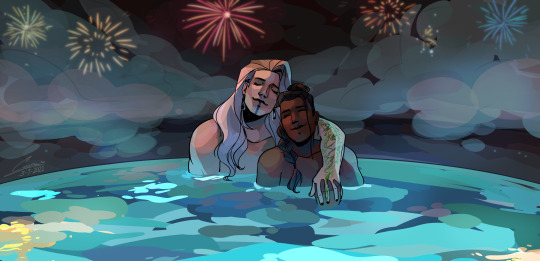
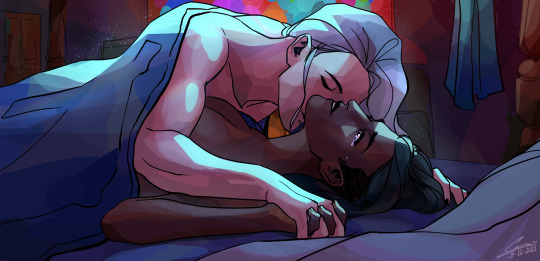
date night ❤️ [C2E126]
after 3 weeks, i finally finish my beauyasha date art! amidst all the other crazy shit that’s happened since then, i still got this episode on my mind.
🌟 Instagram | Twitter | Youtube 🌟
#I would die for Marisha Ray#never before have we been so blessed#this art is incredible this episode was incredible
14K notes
·
View notes
Text
Beau: hey I'm here for your pace. We'll go as slow as you like, and if it goes nowhere you're still my favorite.
Yasha, nodding pensively: Right, well. Firstly I'm in love with you. Secondly, I have watched so many things try to eat you and I'm certain I can do it better. How about it.
963 notes
·
View notes
Photo

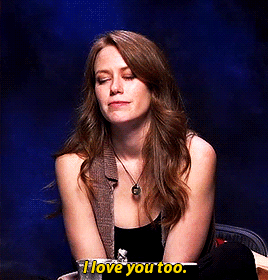

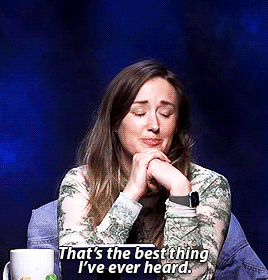
I fell in love with you.
3K notes
·
View notes
Text
Ohmygod I just caught up on CR and I know I’m behind everyone else on this and y’all probably did this flail without me but -
Godddddddd Beau’s reaction to Zeenoth’s arrest was even more impactful and meaningful to me than the lesbian date (although as u can imagine watching both those things in 1 day sent me into cardiac arrest)
But just - Beau! Wonderful Beau, who was hurt so badly and so often as a kid that when the Mighty Nein first met her she was like an abused dog, biting first as her only defense mechanism
And she’s grown so much, and she’s made herself into someone who uncovers corruption and fights injustice and protects the innocent, but she’s never looked for any kind of justice for herself, never expected it.... kept working for the Cobalt Soul even though they’d kidnapped her and held her prisoner for years, because they were helping her do good, and it never occurred to her - and never occurred to me as the audience to her story - that anyone would hold them accountable! They were the good guys, so the hurt they did her didn’t get to matter anymore, couldn’t get in the way.
And then Yudala tells her that her hurt matters, that what was done to her was WRONG, and that the person who did it deserves to be held accountable
and Beau’s reaction, GOD, when she tells her friends about it, when she says, “you know when you don’t realize something is wrong until someone tells you, and so instead you just live with it?”
Marisha is so GODDAMN INSIGHTFUL about trauma and the ways we live with it on our shoulders, and she’s so fucking right - when nobody tells us that something is wrong, we live in a world where it isn’t wrong for that thing to happen to us, and having other people acknowledge it is the strangest most upending thing in the world. It was so cathartic to see Beau get that validation and to see her react to it in such a real and heartfelt way
Ugh ugh ugh this is why my CR tag is “I would die for Marisha Ray” who else on the planet is insightful enough to IMPROV a slow and complicated recovery from trauma, holy shit
#I would die for Marisha Ray#I know I’m too late this is what I get for falling behind#but I’m desperate to scream abt this is anyone else still screaming about this?
8 notes
·
View notes
Photo
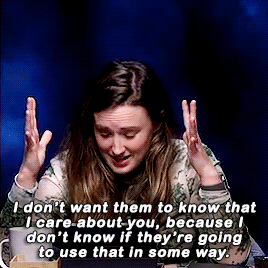
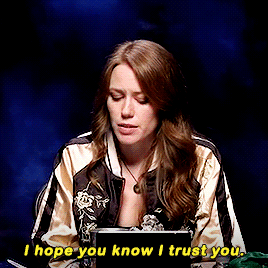




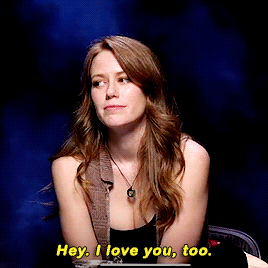

4K notes
·
View notes
Photo
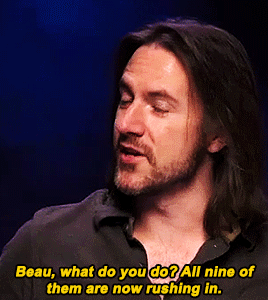
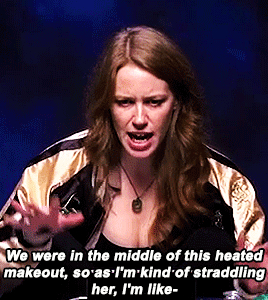
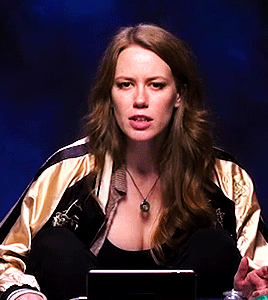
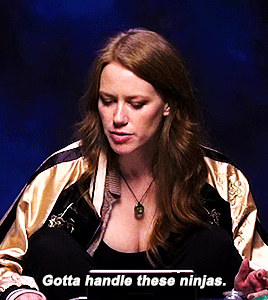
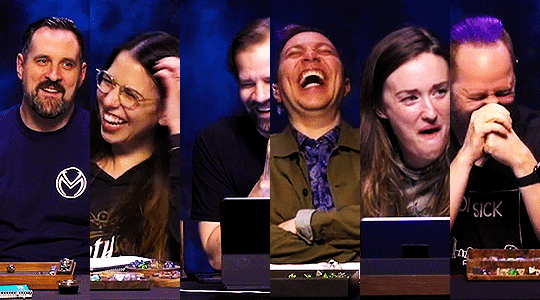
Sorry babe, gotta handle these ninjas.
#I would die for Marisha ray#I am caught up now on#Critical Role#and it literally murdered me I had 7 lesbian strokes on my couch#I have literally never enjoyed anything more in my life than marathoning 125 and 126 today
11K notes
·
View notes





